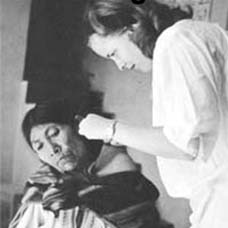January 12, 2005: Headlines: COS - Colombia: Drugs: Crime: Movies: The Globe and Mail: El Rey is one of the 50 movies in the running for this year's foreign-language Academy Award. An urban legend plays a key role in the movie -- American Peace Corps workers teamed up with El Rey and other early traffickers to bring cocaine to U.S. soil
Peace Corps Online:
Directory:
Colombia:
Peace Corps Colombia :
The Peace Corps in Colombia:
November 6, 2004: Headlines: COS - Colombia: Drugs: Crime: Miami Herald: While it may seem preposterous to many in the United States, it's a commonly held belief here that Peace Corps volunteers first taught Colombians how to process coca leaves into cocaine :
January 12, 2005: Headlines: COS - Colombia: Drugs: Crime: Movies: The Globe and Mail: El Rey is one of the 50 movies in the running for this year's foreign-language Academy Award. An urban legend plays a key role in the movie -- American Peace Corps workers teamed up with El Rey and other early traffickers to bring cocaine to U.S. soil
El Rey is one of the 50 movies in the running for this year's foreign-language Academy Award. An urban legend plays a key role in the movie -- American Peace Corps workers teamed up with El Rey and other early traffickers to bring cocaine to U.S. soil

El Rey is one of the 50 movies in the running for this year's foreign-language Academy Award. An urban legend plays a key role in the movie -- American Peace Corps workers teamed up with El Rey and other early traffickers to bring cocaine to U.S. soil
Colombian film scores chance at an Oscar
Several other highly praised contenders, including Maria Full of Grace, were shut out of the foreign-language category of the Academy Awards for being too American
By TIMOTHY PRATT
Special to The Globe and Mail
Wednesday, January 12, 2005 - Page R3
El Rey, one of the 50 movies in the running for this year's foreign-language Academy Award, got there by being as scrappy as the street-fighting gangster at its centre -- El Rey, Colombia's first cocaine kingpin, until now forgotten by history.
The movie, which still has no North American distribution deal, could have remained in the festival circuit, racking up massive box-office sales in its home country.
But now it has a chance at fame, worldwide viewers -- and what may be equally important for its director and writer, Antonio Dorado -- evening the score.
"This movie was made in answer to all the movies that have been made in North America about 'the other' -- about us," Dorado said in a recent interview from his home in Cali, Colombia's third-largest city and the setting for El Rey, which means "The King."
Dorado, with his first film, wants to tell a Colombian version of the Drug War in its beginnings, decades before Washington made the country the third-largest recipient of military aid worldwide that it is today.
It is based on a real-life character, a struggling bar-owner who became a violent but Robin Hood-like drug capo in the 1970s, before the Cali and Medellin drug cartels that attracted worldwide infamy and billions in anti-drug money. An urban legend of sorts also plays a key role in the movie -- American Peace Corps workers teamed up with El Rey and other early traffickers to bring cocaine to U.S. soil.
The film's authentic pedigree is what helped him gain a last-minute, wild-card entry into the Oscar race, since his home-grown film with a nearly 100-per-cent Colombian cast was the country's only choice after the Academy of Motion Pictures Arts and Sciences disqualified its first selection, Maria Full of Grace, for being too . . . American.
Or rather, not Colombian enough. The academy cited a rule for the foreign-language Oscars which states: "The submitting country must certify that creative talent of that country exercised artistic control of the film."
The five final nominees for the award will be announced Jan. 25.
Several other widely seen and highly praised films were also shut out of the category, including Walter Salles's The Motorcycle Diaries.
Joshua Marston, U.S.-born writer and director of Maria, expressed his regret to film critics who were following the controversy about his story of a girl who becomes a drug mule.
"It looks and feels Colombian," he told The Los Angeles Times.
But Dorado's point is that it's Colombia's turn to tell its story.
He points with pride to box-office figures in Colombia since his movie opened in the fall -- El Rey has outsold Maria more than two to one.
"When people see it, they like it because the characters are real people, with our own charm and humour, our own idiosyncrasies," Dorado said.
Carlos Llano, distribution director for Cine Colombia, said El Rey has been "one of the top 10" movies of the year for Colombia in a field crowded with Hollywood productions. Since its fall release, nearly 400,000 have seen the movie, compared to about 150,000 for Maria," he said.
"It's a credible, well-told story . . . that creates a sense of identity for people. Everyday people are more likely to see this movie than one about rich people out of Hollywood," Llano said.
David Schmoeller -- a Hollywood veteran whose 27-year career writing and directing started early when his student thesis film was nominated to the Academy Awards for best student film -- said that authenticity in films is an important but often elusive trait.
If you're a director like Dorado, he said, "You're an insider, giving an insider's view of the story. Any Hollywood film will always be an outsider's perspective."
Schmoeller, now an assistant professor in the University of Nevada, Las Vegas, department of film, said he has struggled to get one of his movies made in Cuba for more than a decade.
And though the logistical hurdles posed by U.S.-Cuba relations would make it much easier for him to film in Puerto Rico or the Dominican Republic, he won't do it.
At the same time, he admits, the film -- a love story with political and historical undertones -- "would be a completely different story if it was told by a Cuban."
Juan Carlos Vallejo, a Colombian former professor of international human-rights law, said Dorado's film not only captures the cultural touchstones of Cali's ambience in the seventies, it also defies flat cops-and-robbers stereotypes that recent Hollywood movies about the drug trade have peddled. For example, he points to Collateral Damage, which stars Arnold Schwarzenegger and was filmed outside Colombia.
"[El Rey] gets away from the issue of violence . . . while the other movies, from the beginning, are good-guy/bad-guy stories," Vallejo said.
"It shows how drug trafficking permeated the entire society -- to the point where few of us can raise our hands and say, 'We had nothing to do with that,' " he said.
Vallejo knows about violence, and the social impacts of Colombia's many troubles, as threats he faced due to his human-rights work led him to seek political asylum in the United States. He now resides in northern Vermont and works with Amnesty International on Colombia.
The former academic points to figures sucked into El Rey's vortex as his drug trade grows -- like "Maluco," a cop who resisted bribery for years even while his colleagues were on the take.
"Maluco shows that Colombia doesn't only have bad guys, but also people who struggle to make a better country even while others are sinking it into international infamy by turning it into a narcodemocracy," Vallejo said.
Dorado recalls Maluco as well -- the real-life Maluco. (A nickname which comes from Colombian slang for "bummer" -- which was what he was for El Rey and his gang.) The director remembers when things got a little dicey while shooting in the Cali neighbourhood where El Rey was from. Who should appear to save the day, but Acuna, a former thief down the drug-trade chain, and Maluco, his former thorn in the side.
Both of them -- now in their 70s -- offered to make sure Dorado's film equipment and crew weren't robbed. Dorado hired them as "consultants," providing one of the shoot's more humorous moments.
"I remember Acuna saying, 'This bastard caught me 100 times, and now we're eating off the same plate,'" Dorado recalled, laughing.
Now the two -- anonymous, real-life veterans of the Drug War -- may wind up taking home their piece of an Oscar.
E-mail this Article E-mail this Article
When this story was posted in January 2005, this was on the front page of PCOL:
 | Latest: RPCVs and Peace Corps provide aid
Peace Corps made an appeal last week to all Thailand RPCV's to consider serving again through the Crisis Corps and more than 30 RPCVs have responded so far. RPCVs: Read what an RPCV-led NGO is doing about the crisis an how one RPCV is headed for Sri Lanka to help a nation he grew to love. Question: Is Crisis Corps going to send RPCVs to India, Indonesia and nine other countries that need help? |
 | The World's Broken Promise to our Children
Former Director Carol Bellamy, now head of Unicef, says that the appalling conditions endured today by half the world's children speak to a broken promise. Too many governments are doing worse than neglecting children -- they are making deliberate, informed choices that hurt children. Read her op-ed and Unicef's report on the State of the World's Children 2005. |
 | Our debt to Bill Moyers
Former Peace Corps Deputy Director Bill Moyers leaves PBS next week to begin writing his memoir of Lyndon Baines Johnson. Read what Moyers says about journalism under fire, the value of a free press, and the yearning for democracy. "We have got to nurture the spirit of independent journalism in this country," he warns, "or we'll not save capitalism from its own excesses, and we'll not save democracy from its own inertia." |
 | Is Gaddi Leaving?
Rumors are swirling that Peace Corps Director Vasquez may be leaving the administration. We think Director Vasquez has been doing a good job and if he decides to stay to the end of the administration, he could possibly have the same sort of impact as a Loret Ruppe Miller. If Vasquez has decided to leave, then Bob Taft, Peter McPherson, Chris Shays, or Jody Olsen would be good candidates to run the agency. Latest: For the record, Peace Corps has no comment on the rumors. |
 | The Birth of the Peace Corps
UMBC's Shriver Center and the Maryland Returned Volunteers hosted Scott Stossel, biographer of Sargent Shriver, who spoke on the Birth of the Peace Corps. This is the second annual Peace Corps History series - last year's speaker was Peace Corps Director Jack Vaughn. |
Read the stories and leave your comments.

Some postings on Peace Corps Online are provided to the individual members of this group without permission of the copyright owner for the non-profit purposes of criticism, comment, education, scholarship, and research under the "Fair Use" provisions of U.S. Government copyright laws and they may not be distributed further without permission of the copyright owner. Peace Corps Online does not vouch for the accuracy of the content of the postings, which is the sole responsibility of the copyright holder.
Story Source: The Globe and Mail
This story has been posted in the following forums: : Headlines; COS - Colombia; Drugs; Crime; Movies
PCOL15929
67
.












